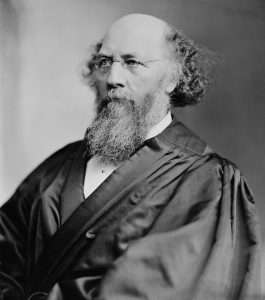The Volokh Conspiracy
Mostly law professors | Sometimes contrarian | Often libertarian | Always independent
Today in Supreme Court History: December 1, 1897
12/1/1897: Justice Stephen Field resigns.

Editor's Note: We invite comments and request that they be civil and on-topic. We do not moderate or assume any responsibility for comments, which are owned by the readers who post them. Comments do not represent the views of Reason.com or Reason Foundation. We reserve the right to delete any comment for any reason at any time. Comments may only be edited within 5 minutes of posting. Report abuses.
Please to post comments


Moore v. Illinois, 55 U.S. 13 (decided December 1, 1852): upholding Illinois statute criminalizing hiding an out-of-state slave (not preempted by Const. art. IV, §2, which speaks only of delivery to owner upon demand)
McAfee v. Crofford, 54 U.S. 447 (decided December 1, 1851): recovery in trespass (invading property and carrying off slaves) includes consequential damages such as property lost due to not having slaves to watch over things (logs allowed to float away on river, invading cattle destroying corn crop) and also merits punitive damages
Clay v. Field, 138 U.S. 464 (decided December 1, 1891): complicated case involving the valuation of a plantation before, during, and after the Civil War, counting in the value that slaves (pre-manumission) added to the property but not the value of the slaves themselves
Slavery Day at the Supreme Court?
When I was a law student poking through West Digests I was surprised to find one of their key number topics was “Slaves”. West didn’t go into business until the 1880’s. . . ?
I found that the first 90 years of our country produced a large body of case law on slaves (not as persons, but as commodities, investments, and breeding stock).
So whenever I find a slave case, I try to post it. December 1 happened to be a "productive" day.
So if someone has some of your slaves, but shouldn’t, and you tresspass to get them back, you are responsible for damages for ongoing tasks they are no longer supporting, and punitive on top of that?
The law grinds slowly but finely.
No, the defendant was the kidnapper of the slaves.
Ohhhhh. I can’t imagine how much slavers owe decimated families and villages back in Africa for yanking people wrongly out of ongoing life enterprises that then suffered, failed, or completely collapsed.
I mean, I understand that you're being descriptive here and I'm not attacking you, but at the same time, that language kind of squicks me out. They were both kidnappers of the slaves.
The reason I cite the holdings of slave cases, in a dispassionate manner, is to squick people out.
I knew the Supreme Court had an accepting attitude toward slavery, but it’s still jolting to see them treating it so casually, like it’s just one of those things.
The antebellum Lincoln had a better – and I think more accurate – constitutional vision of slavery, as well as a foreboding of how the Slave Power would keep using the Supreme Court for proslavery ends.
The pre-Civil War Supreme Court was so accepting of slavery because most of the men who sat on it in those years were actual slave owners. Others while not owning slaves were protective of the institution.
I read enough history to be unfazed. Early America was in a transitional period. In ancient times the victor had the customary right to sack a city and after the slaughter haul off as many slaves as could be carried. In the 19th century the West decided that slavery was bad. In the 20th century the West decided that targeting civilians was bad.
If you want to get icky, see if you can find a Supreme Court case involving what we would now call mistreatment of slaves, beyond what is inherent in having slaves.
I don’t know if mistreatment of a slave was actionable, certainly not by the slave himself. Perhaps if a slave on loan was mistreated the owner might have a claim on the borrower for damaging his property.
Anyway, I don’t ever to get unfazed by accounts of how this country — our own legal system — regarded slaves, particularly when I know that they could well have been ancestors of people I’ve known as friends and lovers.